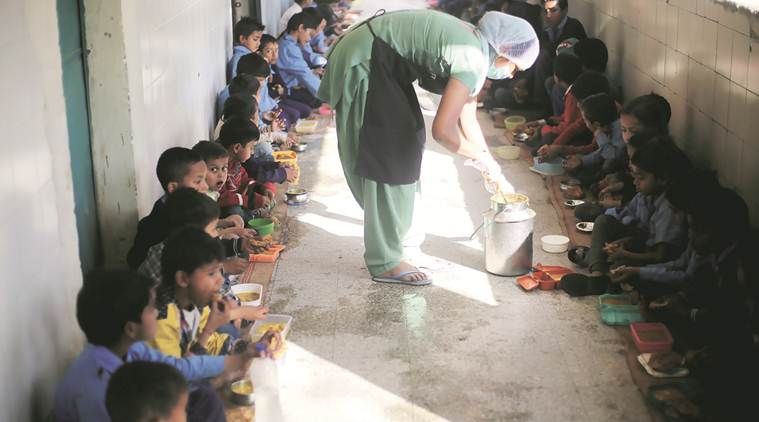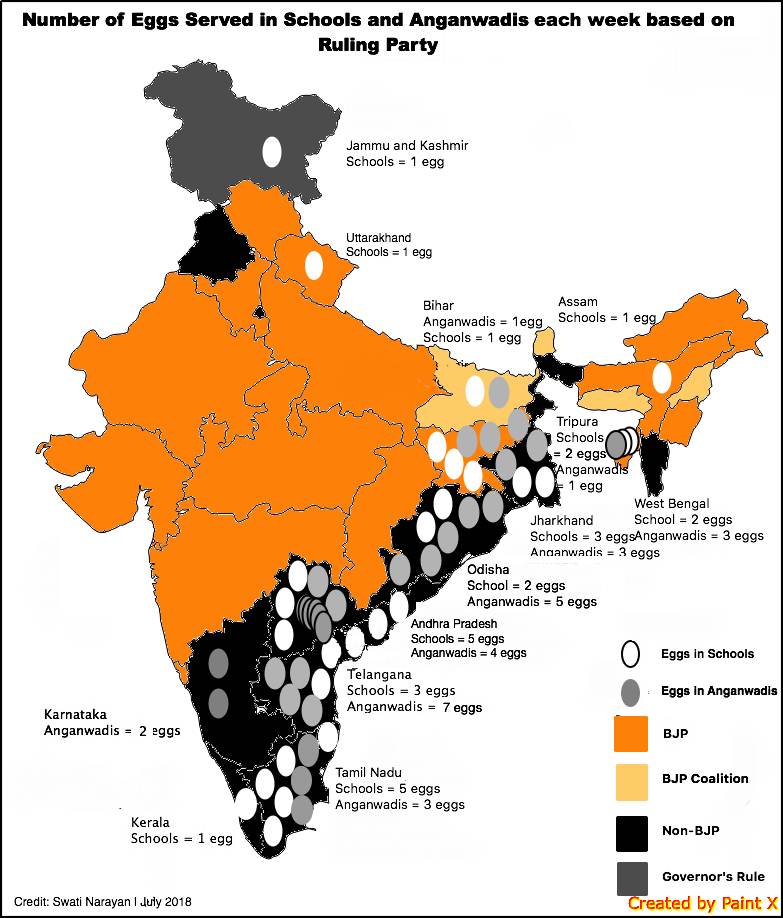Beating back the food police
Many BJP-ruled states deny children a food choice that could address malnutrition

In Madhya Pradesh 43 percent of children under five years are underweight. But influenced by the vegetarian lobby, three years ago, Madhya Pradesh chief minister Shivraj Singh Chouhan’s refused to serve eggs to children in anganwadis.
Two of every five Indian children are stunted. Eggs are nutrition-dense superfoods packed with proteins and essential vitamins. Washington University researchers, for example, have demonstrated with a randomized control trial that feeding infants eggs daily decreased stunted growth by almost half and underweight by three-quarters. Berkeley researchers have also validated that healthy school meals even improve test scores. Yet, 14 of 19 BJP-majority states, deny eggs to children in schools and anganwadis.
The fundamental right to food comprises the right to food choice. Last year, in the case of Saeed Ahmed v State of U.P. (6871 of 2017), on the closure of illegal slaughter houses, the Allahabad High Court had reiterated that even in the case of private food consumption, “food that is conducive to health cannot be treated as a wrong choice and it is for this reason that provisions are obligated on the State to be made available for maintaining the requirement of supply of healthy foodstuff.”
In Madhya Pradesh 43 percent of children under five years are underweight. But influenced by the vegetarian lobby, three years ago, Madhya Pradesh chief minister Shivraj Singh Chouhan’s refused to serve eggs to children in anganwadis. With the BJP coalition assuming the reins of power across 19 Indian states, this antipathy to eggs has spread.
Tribal-dominated Jharkhand, Assam and Tripura are veritable exceptions. In Jharkhand after two concerted civil society Anda Abhiyan campaigns in 2014 and 2015, eggs were finally introduced in schools and anganwadis. Similar to Assam and Tripura, Uttarakhand also has a long-standing state-funded initiative to feed eggs, which will be difficult to dislodge. In Nitish Kumar’s Bihar the saffron party is in the coalition backseat, so this year eggs have been introduced in schools every Friday.

In contrast in non-BJP ruled states in southern and eastern India, eggs abound. In the last two years alone, the Telangana government has chosen to increase the number of eggs served in anganwadis from 4 to 7 each week and Odisha from 3 to 5 funded entirely by the state exchequers. In West Bengal, Jammu and Kashmir and Lakshwadeep fish and chicken are also served unflinchingly as an integral part of local diets.
Tamil Nadu ofcourse is the pioneer. In the fifties, Congress chief minister K. Kamaraj, introduced mid-day meals in schools. Two decades later, the flamboyant former film-star M. G. Ramaswamy (M.G.R) of the AIADMK universalized these school meals. In the spirit of competitive populism, the DMK when it came to power in the nineties introduced eggs. Both these home-grown Tamil political parties owe their allegiance to the iconic Dravidian social reform movement, which germinated with the 1920s non-Brahmin manifesto to subvert the caste system. With this heritage, today Tamil Nadu boasts of a mouth-watering menu designed by nutritionists with 5 unique masala and pepper egg recipes each week.
But across India vegetarianism continues to be a code word for Brahminism. The 2011-12 India Human Development Survey (IHDS) documents that only 27 percent of Brahmin households consumed meat, as opposed to 94 percent of Muslims, 85 percent of adivasis, 77 percent of Dalits, 61 percent of other backward classes and 59 percent of forward castes. So, state-sponsored imposition of vegetarianism in school meals smacks of sanskritised cultural hegemony to emulate upper-caste food habits.
However, some analysts argue that the northern and western states with historically more vegetarian families across caste-groups are justified in blocking eggs from school menus. On the contrary, the IHDS survey shows that except for Haryana, Rajasthan, Punjab and Gujarat, more than 45 percent of the households across the rest of India routinely consume meat atleast once in a month. In BJP-ruled tribal-dominated Chhattisgarh 78 percent of households eat meat, but they are still denied eggs in schools.
Besides all schools provide vegetarian students with the option of choosing bananas instead. Further, Mahatma Gandhi in his book, ‘The Moral Basis of Vegetarianism’ debunks the erroneous myth, “eggs are regarded by the layman as a flesh food. In reality, they are not.” and elucidates that, “…he who can take milk should have no objection to taking sterile eggs”.
Eggs have more proteins than milk. But mercifully, due to the uproar created by the egg ban, few BJP-ruled states have at least begun to distribute milk in schools and anganwadis, despite the greater risk of contamination. But so far only Madhya Pradesh, Haryana, Uttar Pradesh and this month Rajasthan have joined this bandwagon. Gujarat, which pioneered the white revolution is yet to introduce milk in all schools.
Further, with the 14th Finance Commission now the responsibility is entirely on state governments to fund these nutritious additions. The central exchequer accrues the hefty education cess from taxpayers, but the Comptroller and Auditor General recently revealed that since 2007 the Secondary and Higher Education Cess (SHEC) has accumulated Rs 64,228 crore as unspent funds. Instead, these collections could have easily funded eggs in the previous decade.
But the moot question is – will children’s nutrition be held hostage to the sanskritised moral police?
If India’s future generations have to stand tall – literally – “vegetarian” eggs deserve their rightful place in school menus.
The author is a research scholar at the Tata Institute of Social Sciences
For all the latest Opinion News, download Indian Express App
More From Swati Narayan
- What’s in a unique number?Linking of Aadhaar to a growing number of government entitlements is misguided ..
- Soup kitchens are a silver lining for urban poorLast September, the National Food Security Act finally guaranteed two of every three Indians subsidised foodgrains. In fact it is the prolonged delay in its…








































No hay comentarios:
Publicar un comentario